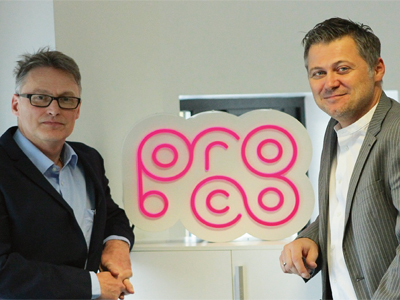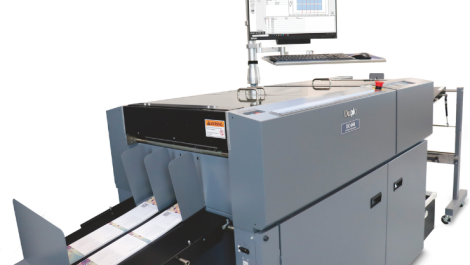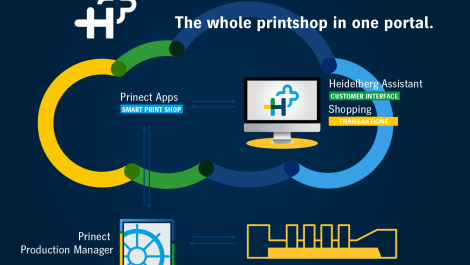ProCo’s managing director Jon Bailey
In Autumn 2014, Sheffield company ProCo invested in the Essex print firm Concept Communications Group, with the intention of creating a strong partnership. ProCo’s managing director Jon Bailey talked to Andy Knaggs about the challenges he has discovered along the way.
There is a definite buzz in the air, and Digital Printer remarks upon it soon after sitting down with Jon Bailey, ProCo’s managing director, at the company’s Sheffield offices.
He smiles knowingly, saying: ‘That buzz…we have had to keep that going for 20 years. It’s a new business buzz, a new company with that excitement and feel about it. New people, new brains, new partnerships – that allows you to keep that passion and excitement in what you do.’
ProCo is not a new company, but nor has it ever been a print company that stood still it seems. Without doubt, it is one of the few in the UK industry that can justifiably lay claim to the marketing service provider tag, with a service offering that synthesises print with campaign management and marketing automation. Accepting change, says Jon Bailey, is in its cultural DNA and was instilled by chairman Mark Schofield ‘right from Day One’.
This is just as well, because ProCo took on another big slice of change in October last year when it acquired a stake in the Stansted, Essex-based Concept Communications Group (CCG). Mr Bailey said at the time that he wanted to build a ‘proper partnership’ between the two print firms and that remains the objective. It is a work in progress, in particular with respect to a project that will integrate the companies’ workflows.
Mr Bailey is a regular at the HP Indigo user group Dscoop, and it was through this network that the partnership with CCG came about: its managing director, Giles Bowes, also attends Dscoop events. The two men had a number of conversations and realised that there was a real alignment in the cultures of their businesses – the mentalities, work ethics and feelings of greater purpose in what each was trying to do.
‘So we decided to pounce on the opportunity and do something about it, rather than talk about it,’ Mr Bailey went on. ‘It wasn’t necessarily in the business plan, but it was definitely in our thought process to look at a partnership.’
ProCo has also been gaining work from customers based nationally and internationally, and the partnership with CCG gives it a southern base. He added that in addition to complementary services and expertise, CCG’s knowledge of automated communications and workflow was excellent for a smaller business.
‘It’s part of that journey to becoming a fully-fledged marketing operations company. That journey has been brilliant: not without its challenges, but it has changed this business every year. It does put you in a mind-set of being willing to change and keep evolving, so this partnership was just another part of that journey really.
‘I really believe that it’s not what we do, it’s what we do for our customers. That’s the mantra we make every business decision on. If it’s not there, there’s no point in doing it. By integrating systems and automating the workflow we are making it an easier experience for customers dealing with either business. If it’s easier for the customer then it’s worth doing. It gives us consistency of CRM, of the message to customers about what we are doing, of cross-selling and up-selling in our sales process.
‘That’s really why the MIS needs to be integrated. Workflow automation is important because the devices in Stansted are not the same as what we have here, and we want to utilise them across the board. What I really liked about CCG was their simple and clear definition of how their workflow should be, so we bolted a lot of that on rather than use ours.’
A lot to learn
Mr Bailey talked candidly about the pressures and challenges he has faced over the last seven or eight months, as ProCo and CCG have come ever closer. It has been a process during which he readily admits to learning a great deal about himself and about managing in business.
‘Driving a business your own way is very different to merging with another business. I have learned a lot about the importance, even when busy running a business, of stopping and explaining things more; you have to get more clarity into what you’re trying to say. I’ve learned that it is very hard work. You have got to put the time in and be visible to both sets of staff. It’s not a token gesture. Putting out a statement is not enough. It requires commitment to the cause of delivering what you are trying to do. The amount of work it takes should not be under-estimated.
‘I’ve also learned that doing a deal like this based on mutual respect and alignment of culture is as important as making the numbers work. We are now in a period of much tighter consolidation and working together; it’s that trust that’s making it work. We are not getting hung up on management changes and who pays who. We are just doing what’s right for the customer and what’s right for each business, and that’s really important actually. I think my team has learned that being bigger does not necessarily mean you are better. They have really seen the benefit of bringing a different mind-set in to add value to the business.’
This is especially important given that ProCo is in the north of England and CCG is in the south. While Jon Bailey and Giles Bowes could rely upon their mutual respect as managing directors if problems arose, the employees at both businesses did not have the advantage of familiarity. Has there ever been a North/South divide during the integration? Mr Bailey replied: ‘You can’t hide from that. I think because we have worked as a business nationally for many years, we’re not that way inclined, but we do play on being Northern; we are very proud of where we are from.

Giles Bowes (left) of CCG and Jon Bailey met through Dscoop
‘It’s always something to bear in mind, but actually the CCG people come up here a lot more than I thought they would. I can’t say there has never been a “them and us”, because there has been. There’s one reason though why this business has become what it is: in its cultural DNA it accepts change. Our chairman set that up right from Day One. Years ago, the reason that adding digital print to ProCo the litho and DM printer worked was because we were absolutely adamant that it was going to work. There was no question. You got a lot of people that were not happy and were worrying about their jobs. ProCo grew as it did because change was driven through with vigour but with clarity. People can express concerns but we turn that into a positive.
‘The same rule applies with this. It has not been a half-hearted project; it’s going to work, it’s going to add value to people’s jobs, and make our customers happy so they become better advocates for the business. We are giving people more job security and excitement. Yes, there have been moments of them and us, but we have stamped that out with vigour because it’s not an option. It has been done very quickly, and I can say categorically that we are well past that. I’m absolutely delighted with the way people are working together as a team. We run the business in a very open and honest way. People can express concerns and we address them.’
Straight shooters
Being honest and straight-talking with everybody has been the key factor in the success of the partnership so far, he said. Nothing should be left unsaid, nothing should be left to fester. He estimates that by around mid-July the workflow integration project will be complete, allowing an automated process between the Sheffield and Essex sites. He is a self-confessed numbers man, and states that ‘the numbers are exactly where I wanted them to be from a CCG perspective, and ProCo is in line with expectations’. The foundation for success is good, he maintains, and over time the partnership will demonstrate the importance of this type of collaboration to the industry as a whole.
He also appreciates having another managing director in Giles Bowes to bounce ideas and thoughts around with.
‘I don’t run this business like the boss,’ he said. ‘It’s not how I work and it’s certainly not how I work with Giles. I really value his opinion; he’s a very clever man and he has done a great job with that business and helped me with this business. We have different strengths and it’s a really positive relationship. Giles is very good at detail, and his knowledge of the industry from a technical and production perspective is fantastic; he knows how to run a business. He’s a very astute guy and finds things in the detail that sometimes I miss. I like numbers from a measurement perspective but I’m also more of a heart-on-sleeve person. I try to create a team with energy running through it. It can be quite a lonely place when you’re running a business on your own. There are some moments when you need that ability to have a conversation with someone who understands the decision you are trying to make. Giles and I both now have someone like that available all the time.’
Much like his business, Jon Bailey seems to be buzzing at these exciting times in his professional life. He is unable to suppress another smile as he concludes: ‘I’m loving it. It’s really good. It’s hard work and it’s not all rosy, but yeah, I do love it. I would get bored otherwise; I’m not good at sitting still.’





